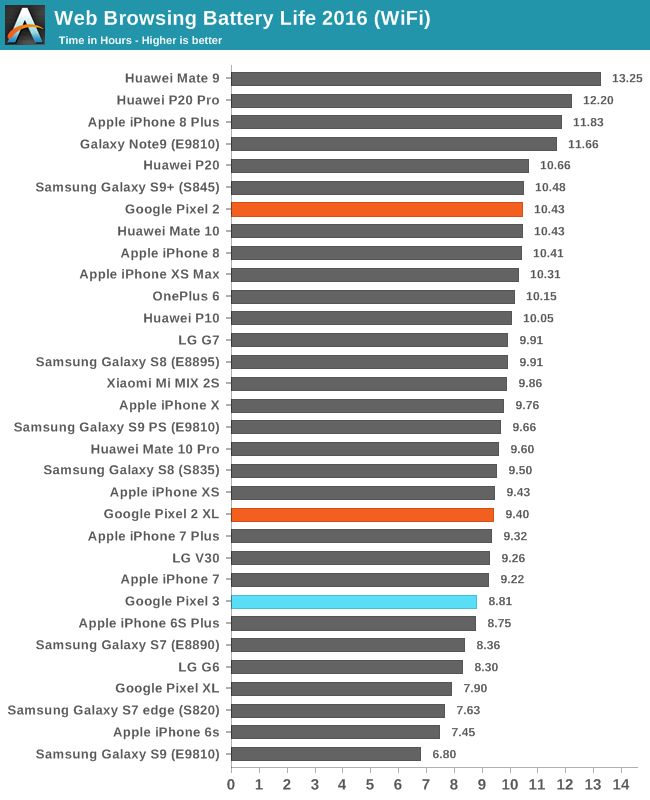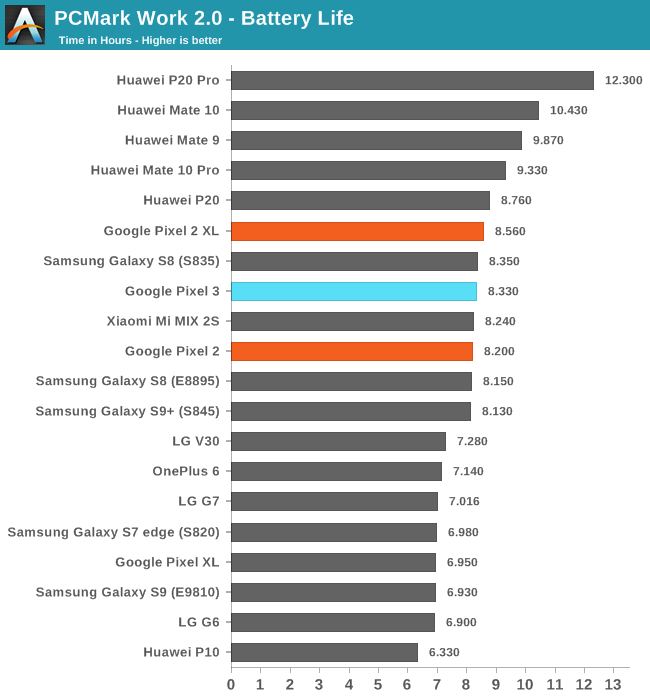The Google Pixel 3 Review: The Ultimate Camera Test
by Andrei Frumusanu on November 2, 2018 11:00 AM EST- Posted in
- Smartphones
- camera
- Mobile
- Pixel
- Snapdragon 845
- Pixel 3
Battery Life
In terms of battery life, we should be expecting the Pixel 3 to do better than the Pixel 2, as we have an 8% larger battery coming at 2915mAh compared to last year’s 2700mAh unit. On the other hand, we also have to consider the Pixel 3 has a larger screen that needs to be powered, and the SoC efficiency can go either way. For our battery tests, we set the device brightness to 200 nits using our colorimeter tools.

Unfortunately, the Pixel 3 sees a regression in terms of battery life, ending up 18% or 1.5 hours behind the Pixel 2 in the web browsing battery test. I did some quick power characterisation, and the Pixel 3 uses about 90mW more power when idling at minimum brightness in airplane mode. Stretched over a 9-10 hour period, this is about 8% of the total battery capacity. On top of this, the phone has to power a bigger screen, and we have a much more performant SoC. Overall the Pixel 3’s battery life doesn’t end up as particularly surprising.

In PCMark, the Pixel 3 sees better performance, as the SoC is able to counter-act the phone general less efficiency. Here the Pixel 3 lands just slightly ahead of the Pixel 2, landing in the middle of the pack in terms of battery life.










135 Comments
View All Comments
Impulses - Saturday, November 3, 2018 - link
They're not using bad sensors, I mean, they often manufacture everyone else's, the post processing is often horrid for Sony tho. You think they could get someone from their dedicated camera division to better tune that (they don't have the greatest JPEG engine either but it's gotten better every year).Edwardmcardle - Friday, November 2, 2018 - link
Awesome review as always. Will there be a mate 20 pro review? Have one and am considering returning because of odd screen issue. Also the new performance mode seems to suck battery, but animations seem laggy when not engaged...would be great to have a professional insight!luikiedook - Friday, November 2, 2018 - link
Excellent review, and comparison photos galore! I think a lot of the day light photos is a matter of opinion. Personally I find the iPhone Xs and Samsung photos over exposed and less pleasing than the pixel photos. The outdoor seating area for example, the black table tops look reflective and almost white in the iphone Xs and Samsung photos.Most of the time the Pixel photos are darker, but I'm not convinced there is less detail, most of the time.
The p20 pro seems to crush everything in 5x zoom.
melgross - Sunday, November 4, 2018 - link
The shadows on the Pixel are all blocked up. It’s pretty obvious. Some people mistakenly equate black shadows with better contrast, as Google apparently does, but that’s wrong. You can always darken the shadows later in a quick edit. But if the detail is killed on the photo, you can never retrieve it.Dr. Swag - Friday, November 2, 2018 - link
Hey Andrei, you got the displays mixed up. The 3XL uses a Samsung amoled panel whereas the 3 uses a p-oled from LG. The table on the first page says the opposite.warrenk81 - Friday, November 2, 2018 - link
haven't even read the article yet, just want to say i'm so happy to see smartphones review return to Anandtech!!spooh - Friday, November 2, 2018 - link
Pixel XL used in the review has optics issue affecting corner sharpness, and light fallof. I think it's also slightly less sharp than good unit.I've had one with the same issue, but returned it.
id4andrei - Friday, November 2, 2018 - link
The Verge reviewer Vlad Savov is a big fan of Google's computational photography. He makes it seem like the Pixel is clearly above the latest flagships. Your expansive review paints a different picture, that of a phone that tries to keep up with a single camera module.On a personal level I have a dilemma. Isn't computational photography basically post-processing? Even if it produces a subjectively better outcome out of stitching several shots, isn't it "fake" somehow as it is not an accurate representation of a frame?
Andrei Frumusanu - Friday, November 2, 2018 - link
> Even if it produces a subjectively better outcome out of stitching several shots, isn't it "fake" somehow as it is not an accurate representation of a frame?Not really. If a sensor fails to have sufficient dynamic range by itself, then even with no processing that's also going to lead no an "inaccurate representation".
Impulses - Friday, November 2, 2018 - link
It's a little fancier than the post processing you could (easily) manage yourself, mostly cause of the way they chop up frames in tiles to then stack them intelligently... You could say it's "fake" in instances where their algorithm just decided to drop a tile to avoid artefacts or movement etc., but wouldn't you just clone those out yourself if you were anal about the overall end result?It's an interesting question without a straightforward answer IMO. It's just gonna vary by shot and usage case, if you're getting consistently better DR then you're consistently closer to "what you see", but all photography is ultimately an interpretation.